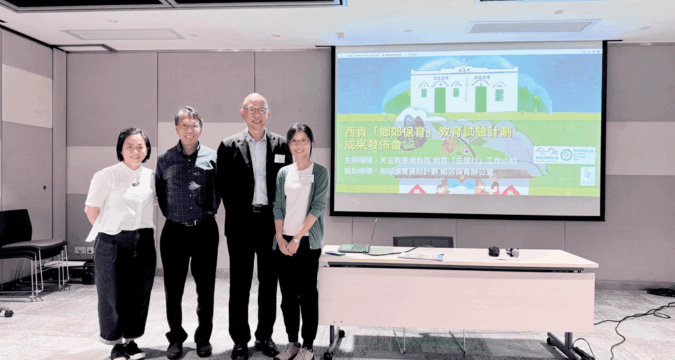
HONG KONG (SE): Over the past two years, the Diocesan Working Committee for Following Thy Way has partnered with the Hong Kong government to run a pilot programme on countryside conservation education. Targeting primary school students from 10 local schools, the initiative offered interactive experiences that deepened their understanding of Hong Kong’s natural ecology and rich cultural heritage.
A conference to present the results of the programme was held on July 12 at The Centre. The programme, supported by the Countryside Conservation Funding Scheme and the Countryside Conservation Office, marks a significant step forward in environmental education and rural preservation.
Based in Sai Kung, the project was designed in alignment with the local primary school curriculum, incorporating elements from both humanities and science subjects. It includes indoor theoretical lessons, outdoor field explorations, and reflective sessions aimed at nurturing students’ knowledge, skills, and environmental values.
Andrew Kwok Chi-keung, principal manager of the Countryside Conservation Office, expressed his appreciation for the programme’s achievements. He highlighted related efforts, including the revitalisation of the Epiphany of Our Lord Chapel in Sham Chung and a plan to connect nine churches in Sai Kung through a pilgrimage trail—projects initiated in 2018 when the office was established.
Active citizen and community participation is essential for success in countryside conservation
Andrew Kwok Chi-keung
“Active citizen and community participation is essential for success in countryside conservation,” Kwok said, noting that the upcoming National Ecology Day on August 15 reflects the government’s ongoing commitment to this cause.
Father Peter Choy Wai-man, chairperson of the Diocesan Working Committee, spoke at the event alongside project manager, Alice Ong. He expressed gratitude to the Environment and Ecology Bureau, as well as to the Hong Kong Outdoor Wildlife Learning Association, for their collaborative support.
“They have worked closely with us over the past two years, offering professional ecological knowledge and outdoor teaching techniques,” Father Choy said. “This enabled students to gain a deeper and more meaningful understanding of the countryside’s natural and cultural wealth.”
He added, “We hope that the programme’s teaching materials and research findings will help establish countryside conservation education as a regular and systematic feature in Catholic schools.”
This collaborative approach has encouraged a more profound connection with cultural heritage and environmental resources
Janice Lo
Janice Lo, from the Hong Kong Outdoor Wildlife Learning Association, shared insights on innovative approaches to environmental education that go beyond traditional classroom methods. She identified three essential pillars of effective learning: gaining knowledge, engaging with nature, and taking proactive steps to care for the environment.
Lo elaborated on the structure of the educational approach, which includes preparation, hands-on outdoor practice, and post-activity reflection. She noted that students benefitted from preparatory activities such as plant surveys, which fostered active observation of their surroundings, as well as reflective sessions that deepened their understanding through discussion and emotional engagement.
“This collaborative approach has encouraged a more profound connection with cultural heritage and environmental resources,” she concluded.



